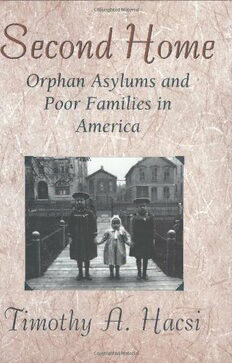
Second Home: Orphan Asylums and Poor Families in America PDF
Preview Second Home: Orphan Asylums and Poor Families in America
Second Home Second Home Orphan Asylums and Poor Families in America TIMOTHY A. HACSI HARVARD UNIVERSITY PRESS Cambridge, Massachusetts London, England 1997 Copyright © 1997 by the President and Fellows of Harvard College All rights reserved Printed in the United States of America Library of Congress Cataloging-in-Publication Data Hacsi, Timothy. Second home: orphan asylums and poor families in America / Timothy Hacsi. p. cm. Includes bibliographical references and index. ISBN 0-674-79644-6 1. Orphanages—United States—History. I. Title. HV983.H33 1997 362.73'2'0973—dc21 97-17063 With love and gratitude, this book is dedicated to the people who raised me: Papa, Mom, Jon, and most of all, my mother Contents Acknowledgments ix Introduction 1 1. The Growth and Triumph of an Institution 11 2. The Changing Nature of Orphan Asylums 54 3. Managers and Funding 75 4. Through the Asylum Doors 104 5. Routine, Discipline, and Improvements in Asylum Life 148 6. Education and Building Character 173 7. Play, Holidays, and Vacations 196 Conclusion 213 Appendix: Supplementary Tables 225 Notes 231 Bibliography 269 Index 283 Acknowledgments Small moments can have surprisingly large outcomes, and the story of this book began when I was the beneficiary of one such moment. In the winter of 1988, Michael Katz and I spoke on the phone about my ap- plication to the University of Pennsylvania's graduate history program. That conversation led to my visiting Penn even though I'd thought I was going elsewhere; my visit led to my enrolling there. It was one of the best decisions of my life. While at Penn I learned a great deal from my fellow history graduate students, and I want to especially thank George Barnett, Dana Barron, Rose Beiler, Debbie Block, Celia Cusson, Sherman Dorn, Thomas Heinrich, Lara Iglitzen, Alison Isenberg, Mary McNear, Max Page, Sue Schulton, Marc Stein, Victoria Thompson, and Monica Tetzlaff. In addition, I owe a great debt to Steve Conn, Jim Heinzen, Jeff Horn, Dave Kerans, Mark Meier, John Noakes, Liam Rior- dan, Rubin Sinins, Dave Smith, and Tim Waples. Of course, I also benefitted from studying with a number of superb professors at Penn. Richard Dunn generously volunteered to teach a class on writing dissertation proposals that helped shape my questions. Two years later, Michael Zuckerman gave what was then the first chapter such a thorough reading that the rest of the manuscript was vastly improved. Mark Stern read most of the dissertation and gave me a great deal of useful advice, not the least of which was his warning against getting bogged down in case records in a study that was intended to be broad. Walter Licht gave the dissertation a thorough and incisive read- ing, in the process giving me the key to turning it into a book. Finally, Michael Katz was my adviser. Few historians can match Michael's un- derstanding of the complexities of history. Just as importantly, he main- tained a high level of intellectual rigor for his students while helping to create the collégial, supportive, non-competitive atmosphere that helps ix χ Acknowledgments make Penn's graduate history program a special place. I could not have asked for a better mentor—or a better friend. As an undergraduate at Oberlin College, I was fortunate to study under a number of dedicated teachers. I would like to thank Geoffrey Blodgett, Carol Lasser, and the late Robert Neil for encouraging my interest in history. Gary Kornblith was my undergraduate thesis adviser, and he became a friend as well as a mentor. His understanding of the contours of American history, and his dedication to teaching his stu- dents how to think for themselves about history, are benchmarks to which we should all aspire. At Harvard University Press, Aida Donald and Elizabeth Suttell have been consistently helpful and have given me good advice throughout an unfamiliar process. I would also like to thank Linda McLatchie for greatly improving the manuscript. At Chapin Hall, I would like to thank Harold Richman, Larry Stanton, Rebecca Stone, and Liz Hurley for providing a supportive environment and different viewpoints on many things. I would especially like to thank Joan Costello, and my fellow Fellows in Chicago: Kathy Hall, Sudhir Venkatesh, and Sam Whalen. I owe Bernadine Barr and Ann Brown special thanks for managing to keep me in academia, at least for now. I would also like to thank Allan Brandt and Alberta Siegel for encouraging my work when it was most needed. The two readers for Harvard Uni- versity Press made a number of suggestions that helped improve the manuscript noticeably, for which I am grateful. There are a number of other people I would like to thank, though in some cases for reasons only marginally related to this book: Dana Barron and Tom Sugrue, Kelly and Henry Kingdon, Joy Kammerling and Dave Smith, Paul, Mari, Katie, and Tommy O'Neill, Chris Hunter, Robin Jaslow, Debby Levy, Linda Lowenthal, Mark Meier, Beth Fordham-Meier, and especially Christy Goldfinch, who had to put up with me when this, in its dissertation form, dominated my life. Finally, I want to thank the four members of my family who raised me, and did so in the least "institutional" manner imaginable. My maternal grandmother ("Mom" to the whole family) passed away a few months before I received my Ph.D., and my father passed away while I was trying to turn the disser- tation into a book. I wish they had lived to hold this in their hands. My older brother Jon was, among many other things, the best of friends and a role model for life. I cannot imagine what my life would have been like without him. Finally, I want to thank my mother, for all the usual reasons and many more. This book is dedicated to them.
